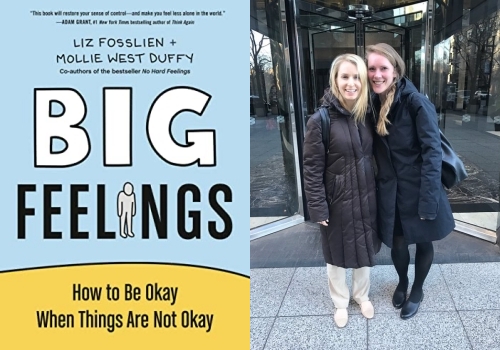More likely than not, you’ve once had a bad enough day at the office for your emotions to bleed through into your meetings. Or maybe you’ve heard an employee sobbing from their cubicle. Awkward, right?
Traditionally, Americans have been expected to leave their feelings at the office door. But with anxiety and depression skyrocketing in a post-COVID-19 world — and the majority of U.S. workers feeling daily stress, according to Gallup — it’s important for businesses to destigmatize mental health issues.
That’s why Liz Fosslien and Mollie West Duffy (known to their 525,000 Instagram followers as simply Liz and Mollie) wrote Big Feelings: How to Be Okay When Things Are Not Okay. They’ve also led workshops and given talks on company culture at Google, NPR, LinkedIn, Spotify, and more. The duo answered b.’s questions together by email.
b.: Between inflation, cutbacks, and the Great Resignation, how can workers navigate their emotions during this strange economic time?
Liz and Mollie: We’ve heard from many teams and leaders that they’re contending with high levels of uncertainty. When people talk about uncertainty, it’s often really about the anxiety it produces. As a leader, it’s important to know that people’s tolerance for uncertainty varies …
We created a short uncertainty assessment to help people evaluate their tolerance. There are three types of people: uncertainty seekers, uncertainty balancers, and uncertainty avoiders. Understanding your tendency — and the tendencies of those around you — can help you make better decisions … and allow others to communicate with you more effectively.
b: As a culture, where do you think we are now in terms of accepting emotions in the workplace?
Liz and Mollie: The pandemic has made it more socially acceptable to talk about feelings because we’ve shattered the divide between work and home. Employees at even the most buttoned-up corporations now tell us: “Yes, I’m bringing my emotions to work — and so are my [direct] reports.”
When we lead workshops, many participants say that they find it frustrating and demotivating when their organizations or leaders don’t acknowledge this shift that has taken place. We’ve written about how leaders can no longer continue to act like things are business as usual.
People want their leaders to be authentic and vulnerable. Though of course, there’s a balance between sharing too little and oversharing.
b.: What inspired you to tackle this topic in Big Feelings?
Liz and Mollie: We pitched a book about dealing with difficult emotions to our editors at Penguin in January 2020, pre-pandemic. And they essentially said, “It’s kind of a depressing book. What’s the audience for this?” Then the pandemic hit in March, and … Penguin came back and said, “You know that book about really hard stuff? We think we’re ready to buy.”
Big Feelings is available in bookstores now.








